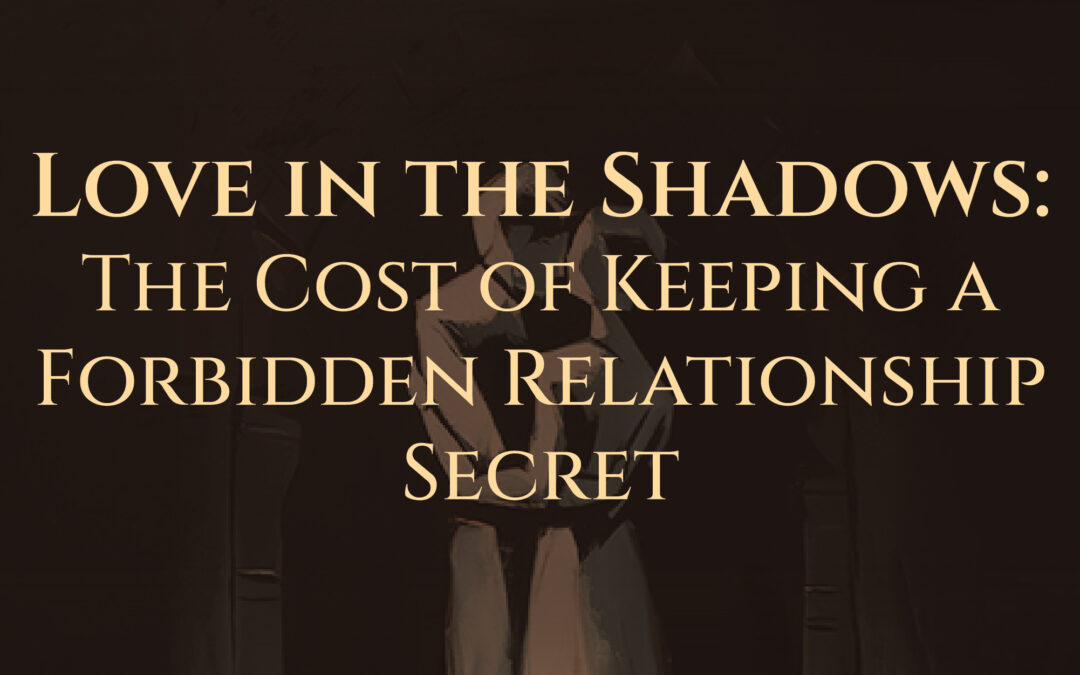Love is often portrayed as a beautiful, liberating force that brings joy and connection. But what happens when love is forced into the shadows? When societal norms, cultural expectations, or personal circumstances demand that a relationship remain hidden, the emotional toll can be immense. Forbidden love, while romanticized in literature and film, comes with a heavy cost—one that often goes unnoticed until the weight becomes unbearable.
In this blog, we’ll explore the emotional, psychological, and social costs of keeping a forbidden relationship secret, and why so many people are willing to pay the price for love.
The Allure of Forbidden Love
There’s something undeniably thrilling about forbidden love. The secrecy, the stolen moments, the sense of rebellion—it can make the relationship feel even more intense and passionate. This is why forbidden love is such a popular theme in stories like Romeo and Juliet, The Notebook, or Brokeback Mountain. The idea of defying the odds for love is intoxicating.
But real life is not a romantic movie. The initial excitement of a forbidden relationship often gives way to the harsh realities of living in the shadows. The constant fear of being discovered, the guilt of deceiving others, and the isolation from loved ones can take a significant toll on both partners.
The Emotional Cost
One of the most immediate costs of a forbidden relationship is the emotional strain it places on those involved. Love flourishes on openness and connection, but secrecy forces partners to compartmentalize their lives. They may have to lie to friends, family, and colleagues, creating a web of deception that can feel suffocating.
The fear of exposure is ever-present. Every text message, every meeting, and every glance carries the risk of being discovered. This constant state of anxiety can lead to feelings of paranoia and stress, making it difficult to fully enjoy the relationship. Over time, the emotional burden can erode the very connection that the secrecy is meant to protect.
The Psychological Toll
Keeping a relationship secret can also have profound psychological effects. The need to hide one’s true feelings and actions can lead to a fractured sense of self. Partners may feel like they’re living a double life, which can cause identity confusion and a loss of authenticity.
Moreover, the guilt associated with deceiving others can weigh heavily on the conscience. Whether it’s lying to a spouse, hiding the relationship from conservative parents, or keeping it secret due to workplace policies, moral conflict can lead to feelings of shame and self-doubt.
In some cases, the psychological toll can manifest as depression or anxiety. The isolation that comes with a forbidden relationship—being unable to share your joy or seek support from others—can make these feelings even more intense.
The Social Consequences
Forbidden relationships often come with significant social consequences. If the relationship is discovered, the fallout can be devastating. Friends and family may feel betrayed, leading to strained or broken relationships. In some cases, the social stigma associated with the relationship can result in ostracization or even violence.
Even if the relationship remains hidden, the secrecy can create distance between partners and their social circles. They may withdraw from friends and family to avoid suspicion, leading to feelings of loneliness and alienation. Over time, this social isolation can make the relationship feel like the only source of support, creating an unhealthy dependency.
The Cost to the Relationship Itself
Perhaps the most heartbreaking cost of a forbidden relationship is the toll it takes on the relationship itself. Love requires trust, communication, and vulnerability—all of which are compromised when the relationship must be kept secret.
The lack of openness can lead to misunderstandings and resentment. Partners may struggle to plan for the future, knowing that their relationship may never be fully accepted. The constant pressure of secrecy can also make it difficult to address conflicts or challenges, as there are few opportunities for honest and open communication.
In some cases, the relationship may become defined by its secrecy, rather than the love between the partners. The thrill of the forbidden can overshadow the deeper emotional connection, leaving both partners feeling unfulfilled.
Why Do People Stay in Forbidden Relationships?
Despite the high costs, many people choose to stay in forbidden relationships. Love, after all, is a powerful motivator. For some, the connection they share with their partner feels worth any sacrifice. For others, the fear of losing the relationship—or the social consequences of coming forward—outweighs the pain of secrecy.
In some cases, the forbidden nature of the relationship can even strengthen the bond between partners. The shared experience of addressing challenges and defying societal norms can create a sense of solidarity and resilience.
Finding a Way Forward
If you find yourself in a forbidden relationship, it’s important to weigh the costs and benefits carefully. Consider whether the relationship is sustainable in the long term and whether the secrecy is truly necessary. If possible, seek support from a trusted friend or therapist who can help you address the challenges.
Additionally, consider the possibility of bringing the relationship into the open. While this may not always be an option, it’s worth exploring whether there are ways to ease the secrecy, even gradually. Honest conversations with those who matter most can sometimes lead to surprising levels of understanding and acceptance.
Is It Worth It?
The answer to this question is deeply personal. For some, the joy and connection they find in a forbidden relationship make the costs worthwhile. For others, the emotional and psychological toll becomes too much to bear.
Ultimately, love should be a source of joy and fulfillment, not pain and isolation. While forbidden love may seem romantic, it’s important to ask yourself whether the shadows are where you truly want to stay.
Love deserves to be celebrated, not hidden. And while the journey out of the shadows may be difficult, it’s often the first step toward a healthier, happier relationship—one that can bloom in the light.

